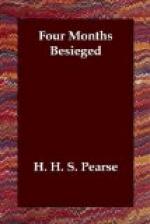But the spies—for they were certainly nothing less—had done their work in locating every point of military importance or personal interest in Ladysmith, and it is hardly possible to doubt that this knowledge was imparted to Boer gunners, who promptly began training their heaviest artillery in the direction of supply depots, ordnance stores, headquarters, intelligence offices, and other places not visible from the enemy’s positions, though within easy range of, and therefore commanded by them, if the gunners knew exactly where to aim so that projectiles might drop over intervening houses and trees. When the most destructive shell burst in my bedroom most people regarded it as an accidentally erratic shot, intended for some other mark. Those who suggested that time and place had been deliberately chosen because Colonel Frank Rhodes, Doctor Jameson, Sir John Willoughby, General French with his staff, and other officers, were known to have lunched in the Royal Hotel on several previous days, met with nothing but ridicule. Colonel Rhodes especially made light of the idea that any gun could shoot so accurately as to get within a few feet of hitting the exact mark aimed at from a range of nearly five miles. Since then, however, the hotel has been nearly struck several times, and on each occasion about the same hour, so that the most sceptical are now changing their opinions in favour of a belief that the Royal Hotel has been marked for destruction. Out of consideration for other guests, therefore, Colonel Rhodes, “the Doctor,” Sir John Willoughby, and Lord Ava have taken up their quarters elsewhere.
It may be a mere coincidence, but since their departure shells have fallen less frequently in this part of the town, though a great many have passed close over the Town Hall, on which a Red Cross flag floats, denoting its use as a refuge for sick and wounded, and the Convent Hospital, conspicuously placed on a ridge behind, has been completely wrecked inside. Fortunately, however, the convalescent patients and nurses were got away before that happened. It will probably be pleaded in justification of the Boers that these buildings, being directly in the line of fire behind our naval batteries, were liable to be hit by high shots from “Long Tom.” The same excuse, however, cannot be made in other cases when shells fell among houses that are not in line with any defensive work, camp, or arsenal. One cannot suppose that a mere desire for wanton destruction of life and property directed the shots, which were probably aimed on the off-chance of hitting officers known or believed to be living in those houses. That would be sufficient justification according to all the accepted ethics of war, and some military men contend even that the Boers would be quite right to shell Ladysmith until it was reduced to ruins if they hoped to accelerate thereby the work they have taken in hand. It must be remembered that Joubert’s main object just now is to gain possession of the town, which it is said he has sworn to capture, and if he thought that end could be hastened by ceaseless bombardment of the place, involving possible slaughter of many unarmed people, there is nothing in the law of nations to prevent him, so long as a military force remains here ostensibly for the defence of Ladysmith.




